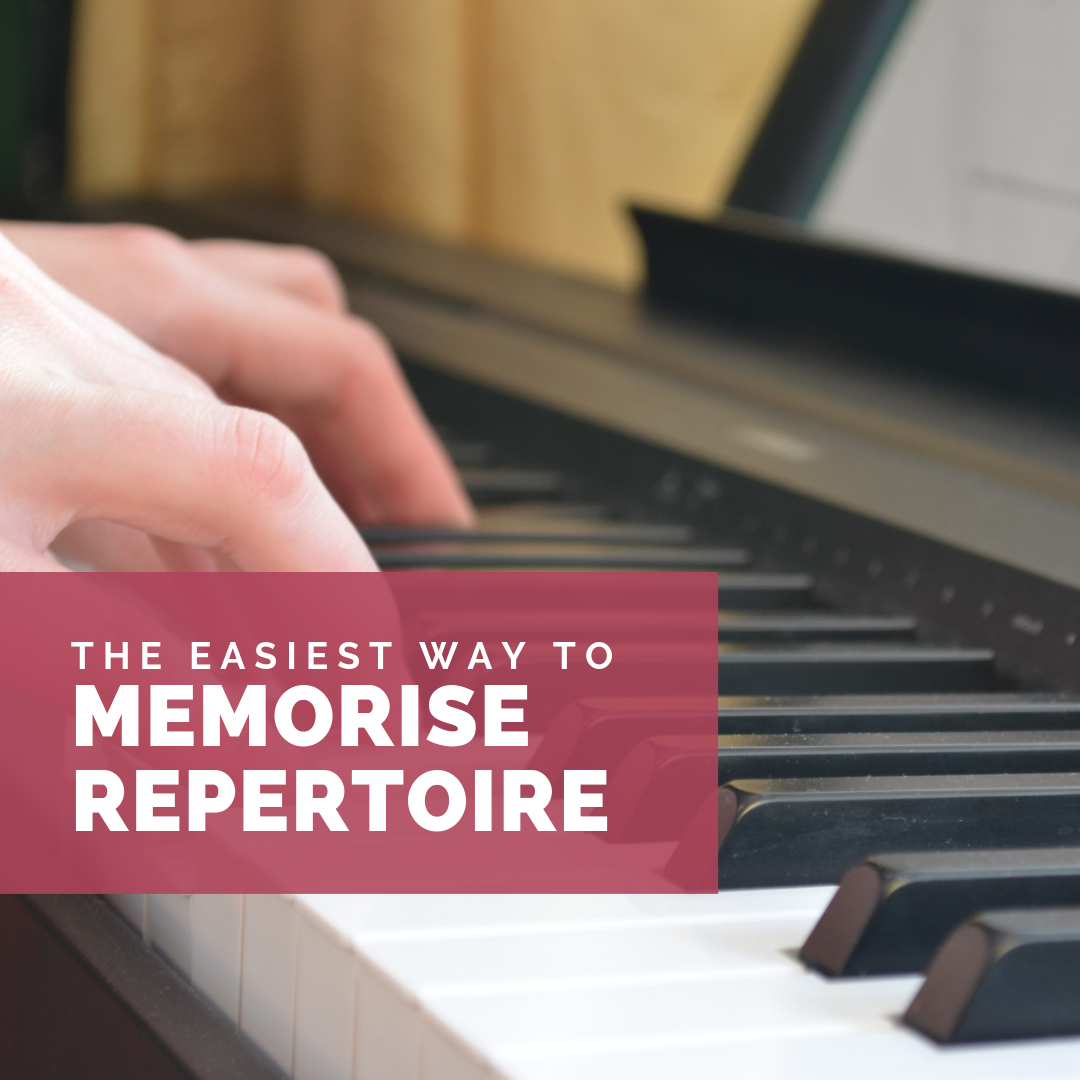The greatest joy of learning an instrument is being able to share your music. Although, some great pianists put in the time to learn a piece, but cannot play without the aid of sheet music. Unless you are already skilled in playing piano by ear or improvising, here are some simple tips to assist you in playing pieces “off by heart” or from memory.

6 EASY STEPS FOR A MEMORISED PIANO REPERTOIRE
Below is a step by step plan on how you can prepare and memorise an extensive piano repertoire.
1. SELECT YOUR REPERTOIRE
Before you begin memorising pieces, you must select what pieces you are to practice and memorise! Select four to five pieces that are a bit easier than the pieces you would normally play. If possible, try to select pieces that vary from each other in style, so that your memorised repertoire is interesting for the audience to listen to.
2. LEARN YOUR PIECES
Find the sheet music for your selected pieces and begin to learn it as you would with any other piece, as to be able to play from memory, you will need to be able to play the piece in the first place.
Keep in mind that your audience is most attentive at the beginning & end of the performance. So what should you do? Pay the most attention to mastering the beginning and ending of the piece! The beginning of a piece can be thought of as a first impression of someone, so it should be neat and tidy. No need to worry about making mistakes in the middle of a piece, as long as you can end it elegantly, all will be ‘forgotten & forgiven’.
3. SIMPLIFY YOUR PRACTICE
If there are some small tricky parts that are hard to master, simplify them. As long as it doesn’t alter the piece too much, cut out any parts that are unnecessarily difficult. Unless you are performing for a piano examiner or a judging panel, chances are your audience won’t even notice the changes.
4. IGNORE REPEATS
Generally, at the social gatherings or events you’ll be asked to perform at, your audience will have a very short attention span. Unless you are playing a song that everyone will sing along to, you don’t have to play through all the parts of Beethoven’s “Fur Elise” or all the variations of Joplin’s “The Entertainer”, but instead just the main themes.
5. THE FORMULA TO MEMORISE EACH PIECE
Now you’ve learnt your pieces with the sheet music in front of you, it is time to begin working it into your memory.
Play through the piece with your sheets, then play two to four bars without mistakes while looking only at the sheet music. Play through the same 2-4 bars, but this time make the effort to look only at your hands and keys. If you need to look up to double check, do it quickly, but we are trying to memorise here! When feeling confident with your memorising progress, play through the sections you’ve been studying with a closed book, keeping your eyes only on your hands and piano keys.
Repeat this process slowly making your way through the entire song or section by section. After going through then entire piece this way, combine larger parts of 4-8 bars at a time, and then even whole sections at a time. Keep adding parts together until you are confident enough to try the entire piece all from memory.
6. MAINTENANCE
Just because you have memorised a piece once, doesn’t mean it will stay in your memory forever. To keep these pieces in your fresh in your memory, you will have to practice them from time to time. We recommend the following practice guide to keeping pieces fresh in your memory, ready to be played whenever asked to play:
- After the first week of memorising the piece, practice playing it from start to finish once daily minimum! Several times a day would be preferred.
- The second week, make an effort to play it every second day.
- The third week, play from beginning to end at least three times throughout the week.
- After a month, play the pieces at least twice a week.
As you refine your skills and progress in your piano playing journey, you may want to begin learning new pieces to memorise and swap them out for the old pieces. If you choose to continue playing the same memorised repertoire forever, or freshen it up with new pieces, keep polishing up your repertoire and take every opportunity you can to share it with others!

We would love to hear from you if you are still considering piano lessons
We are a network of Uni Students looking for piano tutor work….
We offer you 1 on 1 home piano lessons for students of all ages and levels.
If you are looking for an eager, professional & reliable piano tutor to come to your home – one of us will be available, and will be able to provide you a very reasonable piano tutoring rate.
